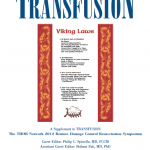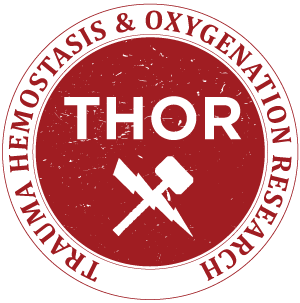
A Supplement to TRANSFUSION: The THOR Network 2012 Remote Damage Control Resuscitation Symposium has been published:
EDITORIAL
Transfusion for remote damage control resuscitation
R.B. Weiskopf and P.M. Ness
ORIGINAL ARTICLES
The Solstrand Remote Damage Control Resuscitation Symposium
G. Strandenes and P.C. Spinella
Remote damage control resuscitation and the Solstrand Conference: defining the need, the language, and a way forward
R.T. Gerhardt, G. Strandenes, A.P. Cap, F.J. Rentas, E. Glassberg, J. Mott, M.A. Dubick, and P.C. Spinella for the THOR Network and RemTORN Study Groups
Practical translation of hemorrhage control techniques to the civilian trauma scene
D.J. Lockey, A.E. Weaver, and G.E. Davies
Pathogenesis of acute traumatic coagulopathy
R. Davenport
Coagulopathy after traumatic brain injury: incidence, pathogenesis, and treatment options
M. Maegele
The microcirculation: linking trauma and coagulopathy
K.R. Ward
Prehospital detection of traumatic coagulopathy
J.S. Hagemo
Near infrared spectroscopy: clinical and research uses
D.A. Hampton and M.A. Schreiber
The development and feasibility of a remote damage control resuscitation prehospital plasma transfusion protocol for warfarin reversal for patients with traumatic brain injury
M.D. Zielinski, D.L. Smoot, J.R. Stubbs, D.H. Jenkins, M.S. Park, and S.P. Zietlow
The evolving role of lyophilized plasma in remote damage control resuscitation in the French Armed Forces Health Service
A. Sailliol, C. Martinaud, A.P. Cap, C. Civadier, B. Clavier, A.-V. Deshayes, A.-C. Mendes, T. Pouget, N. Demazeau, M. Chueca, F.-R. Martelet, and S. Ausset
The use of lyophilized plasma in a severe multi-injury pig model
T.H. Lee, P.Y. Van, N.J. Spoerke, G.J. Hamilton, S.D. Cho, K. Watson, J. Differding, and M.A. Schreiber
Spray-dried plasma and fresh frozen plasma modulate permeability and inflammation in vitro in vascular endothelial cells
K. Wataha, T. Menge, X. Deng, A. Shah, A. Bode, J.B. Holcomb, D. Potter, R. Kozar, P.C. Spinella, and S. Pati
The early use of fibrinogen, prothrombin complex concentrate, and recombinant-activated factor VIIa in massive bleeding
D. Fries
Tranexamic acid in remote damage control resuscitation
J.F. Rappold and A.E. Pusateri
Thrombosomes: a platelet-derived hemostatic agent for control of noncompressible hemorrhage
G.M. Fitzpatrick, R. Cliff, and N. Tandon
Fresh whole blood use by forward surgical teams in Afghanistan is associated to improved survival compared to component therapy without platelets
S.C. Nessen, B.J. Eastridge, D. Cronk, R.M. Craig, O. Berséus, R. Ellison, K. Remick, J. Seery, A. Shah, and P.C. Spinella
Risks of hemolysis due to anti-A and anti-B caused by the transfusion of blood or blood components containing ABO-incompatible plasma
O. Berséus, K. Boman, S.C. Nessen, and L.A. Westerberg
Blood Far Forward—a whole blood research and training program for austere environments
G. Strandenes, A.P. Cap, D. Cacic, T.H.F. Lunde, H.S. Eliassen, T. Hervig, and P.C. Spinella
Development of a riboflavin and ultraviolet light-based device to treat whole blood
H.L. Reddy, S.K. Doane, S.D. Keil, S. Marschner, and R.P. Goodrich
Primary hemostatic capacity of whole blood: a comprehensive analysis of pathogen reduction and
refrigeration effects over time
H.F. Pidcoke, S.J. McFaul, A.K. Ramasubramanian, B.K. Parida, A.G. Mora, C.G. Fedyk, K.K. Valdez-Delgado, R.K. Montgomery, K.M. Reddoch, A.C. Rodriguez, J.K. Aden, J.A. Jones, R.S. Bryant, M.R. Scherer, H.L. Reddy, R.P. Goodrich, and A.P. Cap
